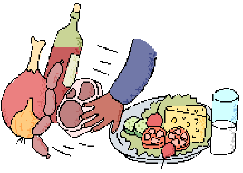
Fats are an essential nutrient found in many foods. Fat carries out many indispensable functions in the body that, along with carbohydrates and proteins, provide energy (calories) to the body.
Eating fats supports your body’s hormone production and improves the absorption of fat-soluble phytochemicals and vitamins A, D, E, and K.
Fats may improve the flavor and texture of food—but eating too much fat is associated with obesity, heart disease, high blood sugar levels, and certain cancers.
Excess added fats can quickly pile on calories, as fats have nine calories per gram-- while carbohydrates and proteins each have only four.
For weight management, all calories need to be controlled, but moderation of fat intake is important because it is so calorie-dense. Adding fats can quickly pile on calories without providing much volume.
For example, a medium baked potato, which is mostly carbohydrate, contains 164 calories. If that same potato is cut-up and deep-fried to make French fries, the added fat pushes the calorie content to 578!
For a healthy diet, limit all fats to less than 20-35% of total calories. That’s about 35 to 70 grams of fat per day for most adults interested in weight control. Fat contributes to a feeling of satiety after eating meals (along with protein and fiber) and for that reason, going to low on fat intake sets you up to feel over hungry and end up eating more than you had planned.
In addition, the type of fat you use can affect your health. Saturated and trans fats have been linked with heart disease, so it is beneficial to limit these Risky Fats.
Both monounsaturated and polyunsaturated fats may help lower your blood cholesterol level when you use them in place of saturated and trans fats in your diet. However, even when you choose healthier Fats, control your portion sizes to avoid excess calories.
Healthier Fats
Monounsaturated Fats:
- Olive, canola, and peanut oils
- Avocado
- Nuts- The best ones to consume are: macadamia, hazelnut. almond, cashew, and pecans (to increase omega-3 fats)
Polyunsaturated fats:
§ Omega-3 fats (essential for brain health and emotional well-being):
- Fish (Use twice per week. Albacore tuna, herring, lake trout, mackerel, salmon, and sardines are rich sources of Omega-3 fats,
although all fish is valuable for the fats that they contain)
- flaxseed or linseed oils
- walnuts
- Fish oil tablets (enteric coated) like Costco soft gels have 440 mg Omega-3 fatty acids/tablet are a good supplement
§ Corn, cottonseed, safflower, sesame, soybean and sunflower oils. It is best to cut back on these oils that begin with "S or C" (corn, soybean, cottonseed, sunflower --except canola) and replace them with monounsaturated fats in cooking, salad oils and margarines.
Some Margarines:
§ Choose a tub or spray variety with no trans fat and no more than 2 grams of saturated fat per Tablespoon.
For additional information (benefits, risks, and food sources) on omega 3 fatty acids visit After the Diet: http://www.afterthediet.com/omega3.htm and Omega 3 Fatty Acid content of Foods: http://circ.ahajournals.org/content/106/21/2747.full.pdf Omege 3 Fatty Acid Complete list.pdf
Risky Fats
Saturated Fats (less than 7% of calories):
§ Animal sources (leaner is healthier):
- Beef, veal, lamb, pork, lard, poultry skin has most fat), butter, cream, ice cream, milk (except nonfat), cheese (watch the pizza!)
§ Plant sources:
- Coconut or palm oils
- Shortening
Trans Fatty Acids (avoid):
§ Hydrogenated oils, stick-style margarines, French fries, donuts, pastries, cookies, crackers, commercially bakes goods, fried fast food, fried snack foods
Cholesterol (limit to 200 mg per day):
§ Egg yolks, meats, poultry and dairy fats
Adapted with permission © 2004, Kaiser Permanente Northwest Health Education Services, Cultivating Health™ Weight Management Kit